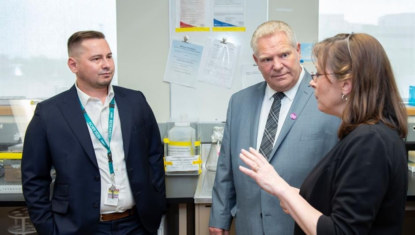13/11/2024
Ottawa, Ontario - Ontario Hospital Association — Wednesday November 13, 2024

The new, world-first artificial intelligence (AI) algorithm called ThinkRare has helped CHEO diagnose children and youth with rare diseases who otherwise would never know, and now the experts behind this groundbreaking work are ready to help children and families around the world.
Harnessing the power of AI, CHEO researchers developed a search algorithm that identifies children and youth who may have an undiagnosed rare genetic disease and refers them for genetic testing – putting an end to their diagnostic odyssey.
In late 2023, the ThinkRare AI algorithm started to scan patient files dating back to 2018 to retroactively identify patients who may have an undiagnosed rare disease.
Then as of early 2024, the algorithm began to run through the electronic medical records of current and new patients at CHEO daily, typically identifying between five and 10 patients each month that might need additional genetic testing.
“A human can’t reasonably look through 260,000 charts a day and try to find these patients. It’s like a needle in a haystack,” said Ivan Terekhov, the director of research informatics, AI and technology at the CHEO Research Institute (RI).
“This algorithm is a game changer,” said Dr. Kym Boycott, Senior Scientist at the CHEO RI and Chief of Genetics at CHEO, who also heads the ThinkRare team.
After a months-long process that includes a referral by a health care provider, CHEO has provided eight children with complete genetic testing called genome-wide sequencing.
Six of those kids have since received a rare disorder diagnosis, or three of every four kids.
On average, this type of testing provides a diagnosis for one of every three children, which shows the ThinkRare algorithm identifies the right patients.
“We were really surprised by such a high success rate,” said Alexandre White-Brown, a genetic counsellor at CHEO who works with patients and families identified by the algorithm.
CHEO has so far diagnosed patients ranging from three to 17 years old. There are also children as young as two who are currently waiting for the results of their genetic tests.
In one case, White-Brown said the algorithm helped them diagnose a nine-year-old boy and his mother, which then led them to later diagnose his two brothers with the same rare genetic disease.
Without the algorithm, this family would still be looking for answers.
“Rare diseases are difficult to understand,” said White-Brown. “They can mimic non-genetic conditions and health-care providers who don’t specialize in genetics might not have all the tools to recognize a rare disease.”
The diagnosis then opens doors for families, and CHEO helps them manage the entire spectrum of a child’s care, including advocating for more resources in school.
The data infrastructure that enabled the development of ThinkRare was created thanks to generous donors to the CHEO Foundation, and CHEO isn’t looking to make money on it.
The ThinkRare team wants to give away its AI algorithm to other pediatric hospitals in Canada and around the world to ensure children can access a life-changing diagnosis sooner and live their best lives.
CHEO also continues to develop and leverage clinical expertise, research and innovation as it undergoes its historic 10-year redevelopment plan.
As part of that ongoing work, CHEO and its RI are working on several AI-based innovations, which includes predicting which kids could return to the emergency department for asthma, improving organ donation and transplantation, and examining transcription software to improve the experience of patient visits.
AI is everywhere, and the ethical, financial, and technical implications are significant and the potential to transform is incredible.
CHEO, in collaboration with its RI, has developed a principled approach to guide the responsible use of AI. A framework is in place to help, as well as consider the risks unique to AI algorithms and what can be done to mitigate those risks.
As a result, CHEO plans to effectively and responsibly bring algorithms like ThinkRare into regular clinical operations.
Access to Full Article on OHA: https://www.oha.com/news/cheo-hopes-to-share-world-first-ai-algorithm-to-diagnose-rare-disease
